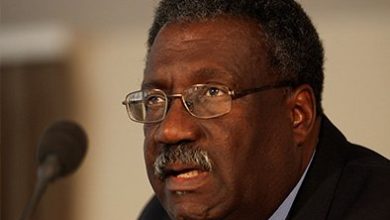Beckles-Robinson wades into the value of remittances

Noting that over 15 million people of known Caribbean heritage reside in the US, with over 4 million in the New York Metropolitan area, Trinidad and Tobago Opposition Leader Pennelope Beckles-Robinson on Saturday, July 12, waded into the value of remittances to the region’s sustainability.
“The Caribbean region values your remittances to families and worthy causes,” said Beckles-Robinson in delivering the keynote address at the New York-based Caribbean Diaspora United, Inc. (CDU) Second Annual Community Unity Breakfast at Russo’s on the Bay on Cross Bay Boulevard in Howard Beach, Queens.
“But more importantly, the region knows that, regardless of where you reside, you love your homeland,” added the first woman elected leader of the People’s National Movement (PNM) in Trinidad and Tobago. “And that love transcends all. We may not say it as often as we should, but we love your love.”
She said remittances are “acts of love.”
“You send school fees, you have two or three jobs, you are quiet heroes,” Beckles-Robinson said. “I know what it was for my mother to send things back home.
Trinidad and Tobago Opposition Leader and PNM Leader Pennelope Beckles-Robinson, third from left, with CDU President Amb. Eugene Pursoon, left, retired judge Sylvia Ash, right, and members of the Trinidad and Tobago Nurses Association of New York. Photo by Nelson A. King“So many of you send back home,” she added. “You will not purchase sneakers for yourselves. I just want to share the sacrifices. And, in some instances, they (beneficiaries) don’t appreciate.
“And the work ethic – if we have half of that, we’ll be better off,” Beckles-Robinson added. “As someone who’s been a beneficiary, many people have sent something – laptops, books – for my constituents. I want to record that thanks and appreciation.”
According to the Washington, D.C.-based Inter-American Dialogue, money transfers to Latin America and the Caribbean “exemplify global economic integration through financial payment rails.”
The Dialogue said it is “a hemispheric organization that builds networks of cooperation and action to advance democratic resilience, shared prosperity, social inclusion, and sustainable development across the Americas”, including the Caribbean.
In its “State of the Remittance Industry and an Outlook for 2025”, released on April 16, 2025, The Dialogue said that, in 2024, nearly US$170 billion was remitted to the region in small-dollar amounts through a vast network of remittance service providers, or money transfer operators (MTOs)—80 % of it from the United States.
Karen Moodie, CDU member, left, presents plaque to Trinidad and Tobago Opposition Leader Pennelope Beckles-Robinson, flanked by former Grenada Amb. Eugene Pursoo. Photo by Nelson A. KingThe Dialogue said the money flow, once considered largely informal and expensive three decades ago, is now managed through a competitive marketplace that offers “accessible, affordable, and innovative services.”
It said migration patterns, return flows, and deportations will continue to influence the volume of transfers sent to the region, particularly for certain nationalities.
“Legislative proposals to tax remittances remain in flux and vary from state to state,” The Dialogue said. “The outlook for 2025 anticipates growth of up to 5 %; however, depending on the severity of a potential US recession—alongside declining migration and rising deportations—growth may fall short of that estimate.”
On June 16, the UN observed International Day of Family Remittances, stating that through the money they send home, “migrants support livelihoods, strengthen economies and contribute directly to the (UN) Sustainable Development Goals (SDGs).”
Over the past decade, the UN said migrants have sent US$5 trillion in remittances to low- and middle-income countries (LMICs), exceeding official development assistance and equaling foreign direct investment.
The UN said more than one-third of these funds have reached rural areas, where they count the most.
It said an estimated US$4.4 trillion in additional remittances will flow to low—and middle-income countries (LMICs) by 2030.
“Remittances are more than just financial transactions—they are a lifeline for millions of families, a catalyst for economic empowerment, and a key driver of sustainable development,” the UN said.
As the world seeks innovative ways to bridge the development financing gap, the UN said the International Day of Family Remittances (IDFR) 2025 campaign calls for “greater recognition of the part remittances are playing in reducing the gap, as well as stronger policies and financial inclusivity to maximize the impact of remittances towards families’ economic resilience and sustainable development.”




